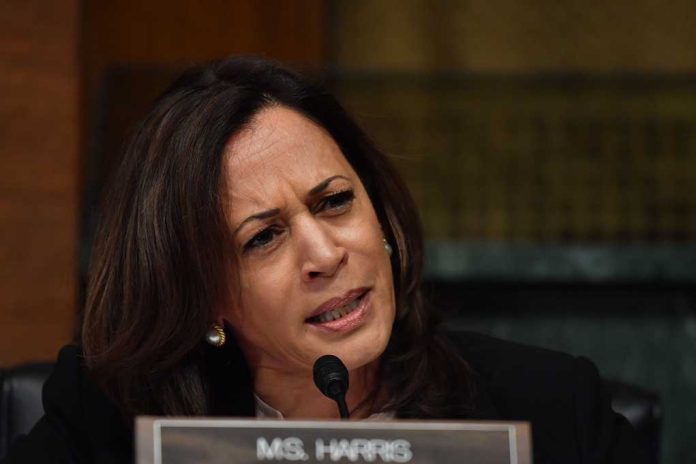
Vice President Kamala Harris’s repeated references to her “middle-class” upbringing in tough interviews raise eyebrows and prompt skepticism about the authenticity of her claims.
At a Glance
- Harris frequently cites her “middle-class” background when faced with challenging questions
- Her parents’ professional backgrounds cast doubt on the “middle-class” narrative
- Critics view this tactic as a potential evasion of accountability
- Harris’s economic vision for America comes under scrutiny
- Conservative analysts question the effectiveness of her policies and promises
The “Middle-Class” Myth?
Vice President Kamala Harris has increasingly resorted to invoking her purported “middle-class” upbringing when faced with tough questions in interviews. This tactic, reminiscent of a child’s excuse for incomplete homework, has drawn criticism and skepticism from conservative analysts. While Harris paints a picture of a modest upbringing, a closer look at her family background reveals a different story.
Harris’s parents were far from the average middle-class Americans she portrays them to be. Her mother was a breast cancer researcher, and her father was a Stanford University economics professor. These white-collar, highly educated professionals hardly fit the typical middle-class mold, raising questions about the authenticity of Harris’s claims and her understanding of true middle-class struggles.
I grew up in a middle-class household. For most of my childhood, we were renters.
When I’m elected President, I will make it a top priority to bring down costs, and increase economic security for all Americans.pic.twitter.com/r5PZq1LJEc
— Kamala Harris (@KamalaHarris) August 16, 2024
Economic Vision or Empty Promises?
In recent interviews, Harris has outlined her economic vision for America, focusing on what she calls an “opportunity economy.” She claims this approach will elevate the struggling working class and ensure all Americans can achieve their dreams. However, conservative critics argue that her proposals are nothing more than a rehash of failed liberal policies that will further burden taxpayers and stifle economic growth.
Harris promises not to raise taxes on individuals making less than $400,000 a year and plans to cut taxes for 100 million Americans. However, her proposal to raise corporate taxes contradicts these promises, as increased corporate taxes often lead to higher consumer prices and reduced job opportunities. This disconnect between promises and economic reality raises concerns about the feasibility and potential negative impacts of her economic plan.
Building up the middle class will be a defining goal of my presidency.
This is personal to me. The middle class is where I come from.
My mother kept a strict budget. We lived within our means, yet we wanted for little. And she expected us to make the most of the opportunities… pic.twitter.com/QvKZ6lC1So
— Kamala Harris (@KamalaHarris) September 10, 2024
Housing and Manufacturing: Misguided Priorities?
The Vice President’s plan to create three million new housing units by the end of her first term sounds ambitious, but critics argue it fails to address the root causes of housing affordability issues, such as overregulation and zoning restrictions. Furthermore, her opposition to the sale of U.S. Steel to a Japanese company, while couched in terms of protecting American manufacturing, may actually hinder economic growth and job creation by limiting foreign investment.
Harris’s criticism of broad-based tariffs proposed by former President Trump as a “sales tax on American consumers” ignores the positive effects these policies had on protecting American industries and jobs. Her alternative proposals, such as a $25,000 down payment assistance for first-time homebuyers and a $50,000 tax deduction for small business start-ups, while appealing on the surface, raise questions about their long-term sustainability and potential to create dependency on government assistance.
Conclusion: Style Over Substance?
As Kamala Harris continues to face tough questions about her policies and vision for America, her reliance on her “middle-class” background as a rhetorical shield becomes increasingly transparent. This tactic, coupled with economic proposals that seem more focused on appealing to voters than addressing fundamental economic issues, raises serious concerns about her ability to effectively lead and implement policies that will truly benefit the American people.
Conservative analysts and voters alike must remain vigilant and critically examine Harris’s claims and proposals, looking beyond the veneer of relatability to assess the true impact of her policies on the American economy and way of life. As the 2024 election approaches, it is crucial to separate rhetoric from reality and demand concrete, effective solutions to the challenges facing our nation.






















